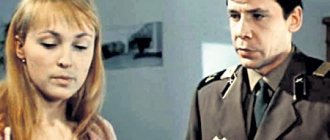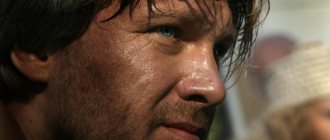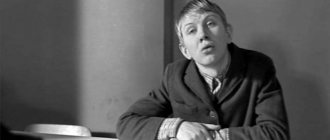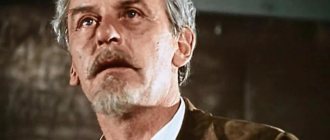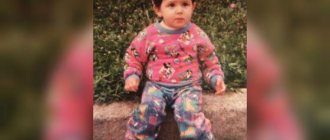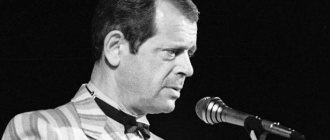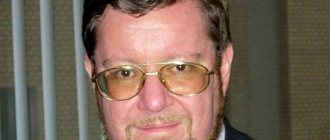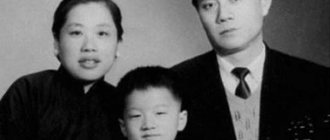Fate is often unfair to great actors. Someone plays in the most box-office and successful films, but cannot receive the coveted award, which goes to a different performer every year. And it happens that an artist remains forever in the audience’s memory, having played one bright role. Such was the actor Pavel Luspekayev, better known to the viewer as customs officer Vereshchagin.
Childhood and youth. War
Born in 1927. The future actor spent his childhood in the village of Bolshie Saly (now Rostov region). The mother belonged to the Don Cossacks, the father was an Armenian. Just before the war, the actor entered the Lugansk school, and then was evacuated with him to Frunze.
Pavel Luspekayev, whose biography is tragic in many ways, ended up at the front at the age of 15. He went to war as a volunteer and ended up in a partisan detachment that took part in combat operations. During one of them, Luspekayev was seriously wounded in the arm. The hospital began preparing for amputation, but the actor, who came to his senses, did not allow this to happen. The hand was saved, but the fighter was not allowed to participate in combat due to health reasons - he was sent to serve at the headquarters of the partisan movement.
The beginning of a creative journey. Theater
Pavel Luspekayev, whose films were still to come, appeared on stage in 1944 as part of the troupe of the Lugansk Regional Theater. Then there were roles in the Tbilisi Russian Drama Theater. Even then, the actor’s repertoire was varied. In 1959, Kirill Lavrov advised Luspekayev to move to Leningrad. There the actor enters the Bolshoi Drama Theater. For several years he was in a creative upsurge and shone on stage. But six years later, due to worsening illness and creative differences, he was forced to leave the BDT. Meanwhile, his talent was noted by Laurence Olivier, who visited the Northern capital. He called Luspekayev a brilliant actor and noted that he had a completely unpronounceable surname.
Works of Pavel Borisovich Luspekayev
Teleplay
- 1965 - The Promise of Happiness.
Book
- Luspekayev P.B. Lady Luck. M.: Zebra E, 2012. 384 p., ill. - (The entire 20th century). — 3000 copies, ISBN 978-5-94663-071-9.
Theater works
Bolshoi Drama Theater named after M. Gorky:
1959 - “Barbarians” by A. M. Gorky; director Georgy Aleksandrovich Tovstonogov - Cherkun;
1959 - “Aesop” by Guilherme Figueiredo; director G. A. Tovstonogov - Agnostos (input);
1959 - “Five Evenings” by Alexander Moiseevich Volodin; director Georgy Tovstonogov - Timofeev;
1960 - “Irkutsk History” by Alexei Nikolaevich Arbuzov; director Georgy Tovstonogov - Viktor Boytsov;
1960 - “The Death of the Squadron” by Alexander Evdokimovich Korneychuk; director G. A. Tovstonogov - Gaidai;
1961 - “The Fourth” by K. M. Simonov; director Ruber Sergeevich Agamirzyan - Bonar;
1961 - “Those who did not bow their heads” based on the script by N. Douglas and G. Smith “Bound by the Same Chain”; director G. A. Tovstonogov - Gallen;
1964 - “Virgin Soil Upturned” after Mikhail Aleksandrovich Sholokhov; director G. A. Tovstonogov - Makar Nagulnov.
Works on television
1965 - “Roman Stories” based on the short stories by Alberto Moravia (television play); director Lev Izrailevich Tsutsulkovsky;
1965 - “The Nose” by Nikolai Vasilyevich Gogol (television play); director Alexander Arkadyevich Belinsky;
1967 - “The Life of Matvey Kozhemyakin” (television play); director A. Belinsky - Matvey Kozhemyakin;
1967 - “Envy” (television play); director M. Sulimov - Andrey Petrovich Babichev;
1969 - “Dead Souls” by N.V. Gogol (television play); director A. Belinsky - Nozdryov.
First film roles
The actor's debut took place in 1954, in the little-known film “They Came Down from the Mountains.” The second film, in the filming of which Luspekayev took part, was a great success. It was a scientific adventure film “The Secret of Two Oceans”. Unfortunately, despite the popularity of the film, Luspekayev’s role remained unnoticed. In 1956, he starred in the film Blue Arrow, which was also a success with the audience. But the actor again got the supporting role, and he again went unnoticed.
Disease
While still at the Tbilisi theater, the director noticed that something was wrong with the young actor’s legs. The military past and the student's hungry life had an impact. During one of the combat operations, Luspekayev had to lie in the snow for a long time, and he received frostbite on his legs. As a result, at the age of 26, he was diagnosed with atherosclerosis of the blood vessels in his legs. The disease progressed. In 1962, she almost cost the actor filming in the film “Nylon Nets.” I had to go to the hospital. Doctors decided to amputate several phalanges of the fingers.
In 1966, the actor began filming the film “Republic of SHKID”. This was a great success, since the film promised to be successful. But the disease made itself known again. Doctors informed Luspekayev that he urgently needed amputation of his legs to the knees. But the actor could not undergo such an operation. This would put an end to his career. He proposes a compromise - amputation of the toes. The operation was successful, but Luspekayev began to suffer from terrible phantom pains of such intensity that he had to keep increasing the dose of painkillers. When the count reached dozens of ampoules a day, the actor realized that he was now completely dependent on medications. He decides to stop taking painkillers. He was in a semi-fainting state for more than a week, until the Minister of Culture Furtseva was told about his difficult situation. She, admiring the actor’s courage, ordered to find medicines and prosthetics for him abroad.
The life of remarkable people: Pavel Bagdasarovich Luspekyan (Luspekyan)
Islands (TV show) - a series of documentaries about cultural masters.
Pavel Borisovich (Bogdasarovich) Luspekaev (April 20, 1927, Bolshie Saly, Rostov region - April 17, 1970, Moscow) - Soviet theater and film actor. Honored Artist of the RSFSR (1965), Laureate of the State Prize of Russia (1997, for the feature film “White Sun of the Desert”, posthumously). Participant of the Great Patriotic War.
Biography Childhood and youth Pavel was born on April 20, 1927 in the village of Bolshie Saly, Myasnikovsky district, North Caucasus region (now in the Rostov region). Father - Bogdasar Ghukasovich Luspekyan - was from Nakhichevan Armenians (from the village of Bolshie Saly), worked as a butcher; mother Serafima Avraamovna Kovaleva is a Don Cossack[3]. In the early 1940s, Pavel entered the Lugansk vocational school, later evacuated with him to Frunze, and worked as a mechanic.
In 1943, as a sixteen-year-old teenager, he volunteered for the front. He ended up in one of the partisan detachments and repeatedly participated in combat operations as part of a partisan reconnaissance group (“Task Group 00134”). During one of the battles, Luspekayev was seriously wounded in the arm by an explosive bullet and his elbow joint was crushed.[4] He was sent to the Saratov military hospital, where they urgently began to prepare for the amputation of his hand. By an effort of will, Luspekayev swam out of unconsciousness and did not allow the surgeon to touch his arm until he vowed to try to do without amputation[5]. The hand was saved. After recovery, P. Luspekayev was assigned to serve at the headquarters of the partisan movement of the 3rd Ukrainian Front. In 1944, having been demobilized from the army, Luspekayev moved to Voroshilovgrad (now Lugansk).
Creative years In 1946, Luspekayev entered the Higher Theater School named after M. S. Shchepkin (course of K. A. Zubov). He stood out noticeably among his fellow students; In the subject of acting, teachers invariably gave him an “excellent” grade.
While studying, Pavel met a student, Innesa Aleksandrovna Kirillova, who was two years older than him. They soon got married and had a daughter, Larisa.
After graduating from the Shchepkinsky School in 1950, Luspekayev and his family moved to Tbilisi[6]. In 1957, the Luspekayevs moved to Kyiv, and two years later settled in Leningrad.
In 1962, shortly after filming of the film “Nylon Nets” ended, the actor was admitted to the hospital. During the war, in one of the reconnaissance raids, Pavel had to lie motionless in the snow for four hours, and his feet were severely frostbitten. Since then, blood circulation in the legs has been disrupted, and already at the age of 26, Luspekayev developed atherosclerosis of the blood vessels in the legs. Now the old disease has worsened. He underwent two operations: first on his nasopharynx, and then on his legs - some phalanges of his toes were amputated. On March 1, 1965, he officially retired due to disability.
In 1966, in the midst of filming the film “Republic of SHKID,” Luspekayev’s illness worsened again. The actor was again admitted to the hospital. Doctors insisted on amputating both legs to the knees. However, this would put an end to Luspekayev as an actor. Only when it became clear that there was no way out, and delay threatened death, Luspekayev agreed to a dangerous compromise: the amputation of his toes. After this, he began to suffer unbearably from phantom pain. On the recommendation of doctors, he began taking a powerful painkiller drug - pantopon[7]. When the dose reached sixteen ampoules a day, Luspekayev firmly decided that he needed to get rid of this addiction. To somehow distract himself, Luspekayev asked his wife to bring him a bag of sunflower seeds. However, this helped only slightly. For a week the actor was in a semi-conscious state and refused food. The Minister of Culture Ekaterina Furtseva provided Luspekayev with great assistance. When she heard rumors about a talented actor suffering from pain, who despite this was acting in films, the minister ordered to obtain the necessary medicines for Luspekayev abroad, as well as prosthetics from France[7]. In his diary, the actor carefully recorded the hours, and then the days, lived without drugs. When Luspekayev finally felt that he had freed himself from drug addiction, the first thing he took on was to start drawing sketches of prosthetics for himself.
Last years of life and death In 1969, during the filming of the film “White Sun of the Desert,” Pavel Luspekayev’s health deteriorated. His wife carried a small folding chair with her, since the actor was forced to rest every twenty steps.
Pavel Luspekayev died on April 17, 1970 from a rupture of the cardiac aorta at the Minsk Hotel in Moscow, just three days short of his forty-third birthday.
The Bolshoi Drama Theater of Leningrad refused to bury him, citing the fact that the actor did not work for them. Lenfilm took upon itself the mourning efforts[9]. The actor died on the eve of the centenary of the birth of V.I. Lenin. A nationwide celebration was announced for the Union and mourning did not fit into the schedule of ceremonial events. The funeral organizers did not know where to hold a civil memorial service[8]. Luspekayev's body was transported to Leningrad and buried in the Northern Cemetery. At his grave, St. Petersburg customs officers, who call Luspekayev the main customs officer in Russia, erected a monument with the inscription: “With a bow from the customs officers of the North-West.”
Family Pavel Luspekayev's wife Inessa Aleksandrovna Kirillova (1923-1988) worked at the Bolshoi Drama Theater before her retirement, then led a drama club at the Leningrad College of Architecture and Civil Engineering. She died in 1988 and was buried next to her husband. Daughter Larisa graduated from the history department of Leningrad State University[7]. Works in the hotel business. Granddaughter Daria graduated from the St. Petersburg branch of the Russian Customs Academy and works in her specialty at Pulkovo Customs. Grandson Alexander studies at St. Petersburg State Polytechnic University. Creative activity In 1944, Pavel was enrolled in the troupe of the Voroshilovgrad Regional Russian Drama Theater. During the two years he was there, he played several roles, among which the most notable were: Alyoshka (“At the Lower Depths” by M. Gorky) and Ludwig (“Under the Chestnuts of Prague” by K. M. Simonov).
From 1950 to 1957 he played on the stage of the Tbilisi State Russian Drama Theater named after A. S. Griboyedov. Luspekayev’s first appearance on the theater stage took place on November 3 in the role of Martyn Kandyba in the play based on A. Korneichuk’s play “Kalinovaya Grove”. After this, the roles followed one after another. Even then, the young actor’s repertoire was significant and unusually diverse: Vozhevatov (“Dowry”, A. N. Ostrovsky, 1951), Boreyko (“Port Arthur”, A. N. Stepanova), Khlestakov (“The Inspector General”, N.V. Gogol, 1952), Trigorin (“The Seagull”, A. P. Chekhov), Alexey (“Optimistic Tragedy”, V. V. Vishnevsky, 1953), Shock (“In the Lilac Garden”, Ts. S. Solodar, 1955 ).
Luspekayev's film debut took place in 1954. He played Boris in the film “They Came Down from the Mountains” directed by N. Sanishvili. And in 1955 he starred in “The Secret of Two Oceans” directed by K. Pipinashvili. However, despite the fact that the film was a great success among the audience, the role of Kartsev, colorfully performed by Luspekayev, remained unnoticed.
From 1957 to 1959, at the invitation of L.V. Varpakhovsky, P. Luspekayev worked at the Kiev Russian Drama Theater named after Lesya Ukrainka. There he successfully debuted in A. A. Kron’s play “Second Wind” in the role of Baklanov. This role literally amazed theatrical Kyiv. The actor was so organic in it that both spectators and critics were equally delighted with his performance.
Pavel Luspekayev as Nozdryov in the play “Dead Souls” (television play, 1969) In 1959, on the advice of K. Yu. Lavrov, he came to Leningrad and was accepted by G. A. Tovstonogov into the troupe of the Bolshoi Drama Theater[12]. On the stage of the Bolshoi Drama Theater, Pavel Luspekayev made his debut in the role of Yegor Cherkun in “Barbarians” by M. Gorky. With his performance he won the warmest sympathy of the Leningraders. The most notable were the roles of Gallen ("Heads Not Bowed", 1961), Bonar ("The Fourth", 1961), Nagulnov ("Virgin Soil Upturned", 1964). In 1965, Luspekayev left the BDT due to disagreements with the management [what?] and leg disease.
In 1962, Luspekayev received the role of driver Stepan in the film “Nylon Nets” by Gennady Poloka and Levan Shengelia. This role helped Luspekayev reveal the full power of his talent. [source not specified 1613 days] Since soon after the end of filming the actor was admitted to the hospital, the role of Luspekayev in “Kapron Nets” was voiced by Leonid Gallis.
In 1966, the actor starred in the film by G.I. Poloka “Republic of SHKID” in the role of KostAlMed. Initially, it was planned to film two episodes, with Luspekayev assigned one of the main roles. His hero had to go through a lot of different stories, among which was a secret love for the teacher ElAnLum, a touching friendship with the Shkidovite Savushka. However, illness prevented Luspekayev from completing the role; she remained in just a few frames. Therefore, the interest shown in CostAlMed by critics and spectators at the All-Union Film Festival, held in Leningrad in 1968, was unexpected for Luspekayev.
Luspekayev's last film role - Ivan Artamonov, a man looking for the grave of his son who died in the war - took place in the television film “Such a Long, Long Road...”; The film's release was delayed due to censorship - in the first scene of the film, Luspekayev's character drinks beer in Leningrad near the Tauride Garden and thinks out loud. The scene with a hint of obscene humor was cut out, and the release of the film on television was delayed until 1972, after his death.
At the end of 1969, the Belarusfilm film studio began filming the feature film “All the King's Men.” Luspekayev was invited to play the main role of Governor Willie Stark. However, he did not get to play the whole role. He passed away when about thirty percent of the film was shot. As a result, they were re-shot with a new performer - G. Zhzhenov.
The crowning achievement of his acting career is “White Sun of the Desert”
Luspekayev played in 20 films during his short life. But resounding success came to him at a time when he was already having difficulty moving. Despite a serious illness, the actor decided to participate in the filming, although at first he refused. After thinking, Luspekayev set one condition - he will film without understudies. As was customary then, he had to audition and was immediately approved for the role. Moreover, it was decided to leave the name Pavel for the hero of the picture - it was no longer possible to call him anything else, so accurately did Luspekayev fit into the image of Vereshchagin. Although according to the script the customs officer's name was Alexander.
The actor was filming in 1968, after amputation of his feet, and had difficulty moving. The director, seeing his torment, proposed an option to change the script in which Vereshchagin would walk leaning on crutches, but the actor immediately rejected this idea. Luspekayev made a drawing of special metal stops hidden in boots that would allow him to move without a stick or crutches. With the help of such shoes he could take off, although not for long. But since the filming took place on the shores of the Caspian Sea, the car got stuck in the sand, and the actor had to walk part of the way. His wife helped him walk, and then Pavel Luspekayev rested on the shore, dipping his feet in the sea.
Initially, Vereshchagin's role in the film was insignificant. But the director, observing the actor’s work, significantly expanded it, turning the customs officer into one of the main characters of the film.
Luspekayev was proud of this role. The actor did not like to watch himself on screen. According to the recollections of his friend Mikhail Kozakov, with whom he went to the premiere of “White Sun of the Desert” at the cinema as a simple spectator, Luspekayev was worried and worried that he would not like the film.
Departure
April played a big role in the actor’s life. This month he was born, and in it he learned what all-Union glory was. In April 1970, he passed away. This happened on the 17th. The actor was alone in a hotel room in Moscow and died of a ruptured aorta. Pavel Luspekayev was only 42 years old.
His last work was not “White Sun of the Desert,” as many viewers believe, but the film “All the King’s Men.” He managed to star in only a third of the film, and after his death, Luspekayev was replaced in the film by Georgy Zhzhenov.
Facts[edit | edit code]
| This section is an unordered list of various facts about the subject of the article. Please bring the information into an encyclopedic form and distribute it to the appropriate sections of the article. As decided by the Wikipedia Arbitration Committee, lists should preferably be based on secondary, aggregated authoritative sources that provide criteria for inclusion of items in the list. |
- After a visit to Leningrad, British theater and film actor Laurence Olivier spoke about Luspekayev like this: “In Russia, in the Bolshoi Drama Theater, there is one actor - an absolute genius!
It’s just impossible to pronounce his last name” [5]. - The song about “nine grams in the heart,” which Vereshchagin sang, which became the hallmark of the film “White Sun of the Desert,” was recorded in two attempts, accompanied by two different guitarists[4][24].
- Vereshchagin’s
face in the episode on the longboat is real. The actor arrived on the set with a knife wound on his face, which he received in a fight with local residents in a nearby pub[25]. - In the film “White Sun of the Desert,” the longboat on which Vereshchagin dies exploded on the count of 42. Pavel Luspekayev died at forty-two from a rupture of the cardiac aorta.
Pavel Luspekayev: the grave of the actor and monuments dedicated to him
It’s sad, but the Bolshoi Drama Theater refused to take on the hassle of organizing the funeral of the wonderful actor. The administration referred to the fact that he no longer worked for them. Then Lenfilm covered all expenses. Pavel Luspekayev was buried at the Northern Cemetery of Leningrad. For some time, his grave was desolate, until Leningrad customs officers took over its construction, for whom the image of Vereshchagin became the embodiment of the country's main customs officer. Every year on their professional day they come here - it has already become a tradition.
Luspekayev's talent was highly appreciated, as often happens, after death. In 1997, for his role in “White Sun of the Desert” he was awarded the State Prize of Russia. Several monuments are dedicated to the actor. One is located in Lugansk, the other is near the walls of the Kurgan customs house, and another statue is installed on the border between the Rostov and Donetsk regions.
A customs ship currently serving on Sakhalin was named in honor of the hero of the film “White Sun of the Desert.”
Notes[edit | edit code]
- ↑ 12
BNF identifier (French): open data platform - 2011. - Decree of the President of the Russian Federation dated June 6, 1998 No. 656
- Gordon Boulevard newspaper | After the amputation of the toes on one leg and the foot on the other, Pavel Luspekayev began to suffer from phantom pain, and they began to inject him with drugs (unspecified)
(inaccessible link). Retrieved December 13, 2014. Archived December 13, 2014. - ↑ 123
TVNZ - ↑ 123
Lithuanian courier (inaccessible link) - Tbilisi biography of the hero of “White Sun of the Desert” Vereshchagin
- ↑ 1 2 3 4 Besik Pipia.
Vereshchagin, one among his own
(undefined)
. Nezavisimaya Gazeta (February 3, 2003). Retrieved April 26, 2015. - ↑ 1 2 Oksana Marchenko.
Tetyana Lanina, theater critic, author of the book “Pavlo Luspekev” (Ukrainian). Author's program by Oksana Marchenko “Names” (March 22, 2005). Retrieved April 26, 2020. - News of Ukraine and Crimea (unspecified)
(inaccessible link). Retrieved January 11, 2008. Archived January 10, 2008. - Luspekayev's grave at the Northern Cemetery
- Pavel Luspekayev (unspecified)
(inaccessible link). Retrieved January 22, 2007. Archived October 9, 2007. - Luspekayev Pavel. 85th birthday // TV channel “Culture”
- He was on his longboat and did not give the go-ahead to everyone
- Decree of the Presidium of the Supreme Soviet of the RSFSR dated April 23, 1965 “On conferring honorary titles of the RSFSR to artists of the Leningrad Academic Bolshoi Drama Theater named after M. Gorky”
- Decree of the President of the Russian Federation of June 6, 1998 No. 656 “On awarding State Prizes of the Russian Federation in the field of literature and art in 1997” (unspecified)
(inaccessible link). Retrieved April 17, 2020. Archived April 18, 2020. - Encyclopedia of Russian Cinema (undefined)
(inaccessible link). Retrieved January 17, 2008. Archived October 22, 2007. - 1 + 1 news (unspecified)
(inaccessible link). Retrieved January 11, 2008. Archived February 15, 2006. - Nakhichevan news (undefined)
(inaccessible link). Retrieved January 11, 2008. Archived August 10, 2007. - “That cruel Lady Luck. Pavel Luspekayev" Documentary film (unspecified)
. TV channel "Russia". Retrieved February 25, 2010. - Sight
- Justmedia (unavailable link)
- Focus
- Ratnikov D. Toponymists take new frontiers // St. Petersburg Gazette. — 2020. — May 19.
- Lyrics
- Pavel Luspekayev and his treacherous “Lady Luck”



